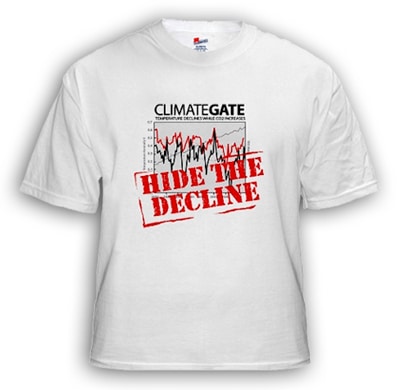There has been much reaction to this weekend’s Elizabeth Rosenthal New York Times piece—“Where Did Global Warming Go?” Clearly, the issue has fallen out of the news, and off the political agenda. The reasons for this are numerous: Politics, the recession, and media coverage are all at play here. But I think the New York Times piece does a stellar job of skirting the truly obvious explanation: a conservative denial machine was whipped up by “ClimateGate,” leading to a whole new and destructive brand of climate politics.
Recall the year 2007. Al Gore and the IPCC win the Nobel Peace Prize. The climate issue is riding high. Many of us assume that the next president will solve the global warming problem for good.
There was already much political resistance to climate action in the U.S. at that time, and right wing think tanks were sowing vast amounts of misinformation—as was Fox News. But the tide had clearly turned against the delayers and deniers…for good, many of us thought.
Then came a little event that the New York Times analysis does not even mention—“ClimateGate.”
It drew dramatic media attention. And while it may not have had a massive impact on public opinion as a whole, it served as a rallying cry for one key slice of the public in particular. As I reported in Mother Jones:
Climategate had a substantial impact on public opinion, according to Anthony Leiserowitz, director of the Yale Project on Climate Change Communication. It contributed to an overall drop in public concern about climate change and a significant loss of trust in scientists. But—as we should expect by now—these declines were concentrated among particular groups of Americans: Republicans, conservatives, and those with “individualistic” values. Liberals and those with “egalitarian” values didn’t lose much trust in climate science or scientists at all. “In some ways, Climategate was like a Rorschach test,” Leiserowitz says, “with different groups interpreting ambiguous facts in very different ways.”
What did “ClimateGate” do for the right? How did conservatives interpret the issue, and how did this drive our plight?
To understand this, you need to understand a psychological process sometimes called “seizing and freezing.” Conservatives, who were losing the climate issue before “ClimateGate,” needed something—anything—to show them they weren’t all wrong about it, and that the fight wasn’t over. “ClimateGate” thus furnished the perfect rallying cry. Conservatives seized on the idea that this scandal proved, once and for all, that climate science was bunk—and they froze on this notion. Now, as a consequence, all you hear in Congress is about ClimateGate, and it is used as an excuse for complete dismissal of modern climate science knowledge, as well as the need for urgent action.
Granted, this is utterly irrational. “ClimateGate” didn’t prove anything of the sort. But it only matters that many conservatives thought it did–many seizing on little more than an out of context quotation, “hide the decline,” which served as a heuristic device–and they linked it in their minds with an utter debunking of any validity of global warming concerns—forever, for good. The absurdity of climate science is now a matter of certainty on the right wing. It’s just a big hoax, they think. And if you don’t believe me, see this Rush Limbaugh commentary on climate change–and what Limbaugh says deeply matters, for he is followed faithfully by millions.
This was all happening, notably, as an intense conservative ideological activation was also occurring—the Tea Party movement. Fear over the recession, and outrage directed towards President Obama, were allowing angry conservative voters to channel their rage into the equivalent of a populist anti-government uprising. The climate issue became central to this movement, perhaps the leading exhibit—after “Obamacare”—demonstrating that the U.S. was lurching towards “socialism.”
Therefore, paradoxically, even as climate science grows ever stronger and more worrisome, conservative denial of scientific reality increased, as did overall partisan polarization over the climate issue.
Now, it would be one thing if we had a media that never printed false claims about climate change or ran phony “balanced” stories about it—and things would also be different if we had a president who had decided to take on the fight nonetheless, or an organized environmental movement that matched the Tea Party in ideological intensity or singleness of purpose. But we don’t have these things. What we do have, though, is a conservative movement that’s full of passionate intensity on global warming. The issue has, indeed, become like abortion and guns—the New York Times gets this right–and that is the key reason why we can’t get anywhere on it.
But another reason is the failure to bluntly acknowledge that this has happened. So let’s say it again: A conservative populist movement has rallied around climate denial, and spread the utter conviction that global warming isn’t real and human caused, and that attempts to address it reek of socialism. These claims are, by any serious standard, nonsensical and not worthy of serious consideration. But they are firmly held and present a massive roadblock to getting anything done–especially so long as the passionate wrongness on the right is not matched by a passionate devotion to accuracy in the media, or a passionate willingness to fight back effectively on the left.
Subscribe to our newsletter
Stay up to date with DeSmog news and alerts






